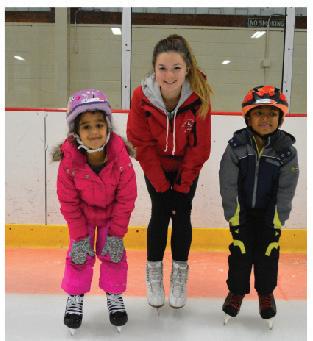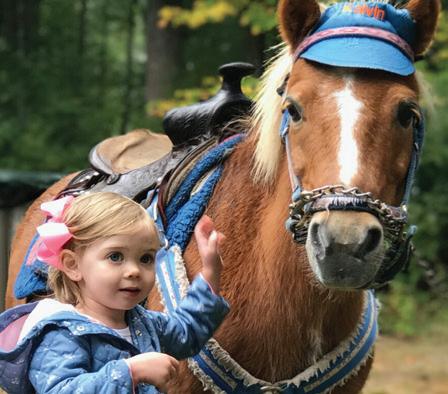
JANUARY 2023



2 Boston Parents Paper | January 2023 Ages 3–18 | Boston and Newton locations Register by February 15, 2023 to receive a 10% discount on summer tuition.
DANCE WITH US THIS SUMMER
Photos by Igor Burlak Photography.

4 Boston Parents Paper | January 2023 TM Receive camp information and learn about more than 75 day and overnight camps as well as summer programs for all ages and interests. and receive access to regularly updated online camp expo materials Save the Date January, February, March, April, May & June https://bostonparentspaper. com/summer-camp-expo to Register 2023 Virtual Camp & Summer Expo
TM
Boston Parent
841 Worcester Street Suite 344 Natick, MA 01760 617-522-1515 info@BostonParentsPaper.com Visit us online at BostonParentsPaper.com


PUBLISHER
Parenting Media, Inc
ART DIRECTOR | Debbi Murzyn
ASSOCIATE EDITOR | Jean Abernathy
ADVERTISING SALES

Holly Castro, David Morney
Boston Parents Paper is published monthly by Parenting Media Inc. Please note that the advertisements in this magazine are paid for, which allows this magazine to be free to the consumer. ©2023
Copies of BostonParentsPaper are distributed to locations throughout Greater Boston and Eastern Massachusetts. Past issues are available on our website, www. BostonParentsPaper.com Send letters to the editor or article submissions to editor@ bostonparent.com. Submit events to our Family Friendly Calendar at bostonparentspaper.com/event

January 2023 | BostonParentsPaper.com 5 January 2023 Volume 38 • Number 5
What’s Inside 6 Family FYI • Get Ready for Summer Camp • Top Baby Names in 2022 • National Parks Fee Free Days 10 Beat the January Blues Keep the party going in 2023 22 School Open House Events 34 Why Parenting Teenagers Wears Me the Heck Out FEATURES... ...AND THERE’S MORE 12 | Starting Early Supporting Language and Literacy Skills for Babies and Toddlers 15 | How to Teach a Child to Ice Skate Ice Skating is Fun! 18 | Helping Children Cope with Traumatic Events 20 | Benefits of Tutoring for a Child 25 25 | How to Pick the Best Camp for Your Child 28 | What Do You Envision for Your Child’s Camp Experience? 30 | Sending Teens to Summer Camp 34 10 15
Looking for a Great Summer Camp?

Don’t miss the Boston Parents 2023 Virtual Camp & Summer Expo starting on Jan. 22. This year we are doing a virtual program for camps that can be customize so you receive the information you want. Please register to receive you customized package of camp information: https://bostonparentspaper.com/summer-camp-expo

TOP BABY Names in 2022

Liam and Olivia topped the list of the most popular baby names again for the third year in 2022, according to Babycenter.com. New names to appear on the top ten boy’s list are Mateo and Leo, bumping off Mason and Ethan. On the girl’s top ten list Evelyn cracked the top 10 being the only new name added, pushing Harper out.
Outside of the top 10 there was plenty of movement with the gender-neutral name River rising 31 places on both the girl and boy lists. Significant risers on the girl list were Athena, Iris and Freya. Names on the boy list rising up the most were Myles, Legend and Atlas.
Family F.Y.I.
GET READY FOR SUMMER!
BOYS 1. Liam 2. Noah 3. Oliver 4. Elijah 5. Mateo 6. Lucas 7. Levi 8. Asher 9. James 10. Leo GIRLS 1. Olivia 2. Emma 3. Amelia 4. Ava 5. Sophia 6. Isabella 7. Luna 8. Mia 9. Charlotte 10. Evelyn Take Five (or 20) minutes to tackle a little postholiday toy overload and pare down clutter with these 5 steps. 1. Look
2. Remove
3. Say
4. Create
5. Ask
6 Boston Parents Paper | January 2023
for things which never get used
toys your kids have outgrown
goodbye to toys with missing or broken parts
a temporary home for items you are not sure about removing
kids if there are toys, books, crafts that they no longer want or need that can be donated to children in need



January 2023 | BostonParentsPaper.com 7 ONE IN 44 CHILDREN HAS AUTISM. WE CHANGE LIVES ONE CHILD AT A TIME. OUR SERVICES ARE BASED ON APPLIED BEHAVIOR ANALYSIS (ABA): Special education schools for autism and developmental disabilities Center-based services for toddlers and young children Early intervention services Home-based services FOR MORE THAN 65 YEARS, MAY INSTITUTE HAS PROVIDED EXCEPTIONAL CARE TO CHILDREN WITH AUTISM AND OTHER SPECIAL NEEDS. 800.778.7601 | mayinstitute.org
BUTTON BATTERY SAFETY
 By Deirdre Farrelly Practice Administrator- Boston Children’s Hospital
By Deirdre Farrelly Practice Administrator- Boston Children’s Hospital
Button batteries power many devices and toys that are used every day. They are small, shiny and usually the size of a coin. Because of the small size, it may not be obvious when they fall out of a device. A child can swallow these batteries very easily. Button batteries can cause life-threatening injuries when swallowed. Tissue damage can start to occur in as little as 2 hours as a result of the battery reacting with saliva. Common symptoms of a swallowed battery are fever, irritability, not wanting to eat or drink, wheezing, throat pain and vomiting. In addition to swallowing, your child could just as easily stick the battery in their ear or nose. Be on the lookout for fluid drainage or blood as well as fever, pain or swelling and irritability.
There may be no symptoms at all but if you think your child has ingested or put a battery in their ear or nose you should go to the nearest emergency room. A child is treated every three hours for button battery ingestions. If your child is over 12 months and you suspect a battery ingestion, you can give them two teaspoons of honey and repeat 4-5 times, waiting 10 minutes between each dose. If your child begins to vomit, stop the honey immediately. Do not force your child to eat, drink or vomit as this could cause further damage.
To prevent your child from a button battery related injury, make sure to regularly check devices and toys around your house. Ensure the battery case is secured tightly and if it cannot be, then keep that device out of reach of children. Do not let small children play with anything that uses these batteries and if you do, watch them carefully during playtime. As with any other hazards, store all loose batteries in a locked cabinet or up and away from children.
PLAY IT SAFE THIS WINTER
• Electric space heaters are a leading cause of fires. They should be placed on flat, noncombustible, non-carpeted surfaces and at least three feet from anything flammable. Never leave them unattended or use them where children play or sleep.
• Avoid hypothermia – an abnormally low body temperature. Symptoms include shivering, slurred speech, lethargy, pale and cold skin, confusion and slowed breathing. In infants, symptoms include bright red and cold skin and lethargy. Call 911 immediately if you notice these symptoms and attempt to warm the child up by removing wet clothing and
2023 National Parks
FEE-FREE Days
According to National Park Service Director, Chuck Sams, “The entrance fee-free days to encourage people to discover the beauty, history and inspiration awaiting them in the more than 400 national parks throughout the country.” Only about 100 of the 400+ national parks have an entrance fee with costs ranging from $5 to $35+. Detailed information about what there is to see and do in each park is available on NPS.gov or the NPS app. It’s important for people to know before they go what is open and available, especially if staying overnight. Fee-free days applies only to entrance fees and does not cover amenity or user fees for camping, boat launches, transportation, special tours or other activities.
The annual $80 America the Beautiful National Parks and Federal Recreation Lands Pass allows unlimited access to more than 2,000 federal recreation areas, including all national parks, for the passholder and companions accompanying them. There are also free and discounted passes available for currently serving members of the U.S. military and their dependents, military veterans, Gold Star Families, fourth-grade students, disabled citizens and seniors.

Free Entrance Days for 2023
January 16: Martin Luther King, Jr. Day
April 22: Earth Day and first day of National Park Week

August 4: Great Outdoors Day
September 23: National Public Lands Day
November 11: Veterans Day
replacing it with warm clothing on the trunk, groin, neck and head. To avoid shock, don’t place the child in warm water or apply direct heat.
• Make sure sledding hills are free of trees and fences, and that they are far from busy roads, not too crowded, well lit, well covered in snow and have a flat runoff.
• Check sleds to make sure there are no sharp edges or cracks. Make sure children can steer them; avoid using snow disks and tubes.
• Wear a multi-sport or winter helmet for all winter sports.
• Children under age 16 should never operate a snowmobile, and kids under age 5 should never ride a snowmobile, even with an adult operating it.
Family F.Y.I.
8 Boston Parents Paper | January 2023



January 2023 | BostonParentsPaper.com 9 DRIVEN TO HELP PARENTS NAVIGATE CHILD CARE THROUGH COLLEGE. SCAN FOR OUR LATEST EDUCATION SERIES
BEAT THE January Blues
By Katy M. Clark
How to Keep the Party Going Throughout 2023
After the excitement of ringing in the New Year, many of us are faced with the January blues. The festive feel of the holiday season is gone and the winter days can be gloomy.
However, each month of the new year brings something to celebrate. Whether it’s enjoying food, honoring animals, or just being silly, here are 12 unique and fun days to commemorate as you keep the party going long into the new year!
January 13: National Rubber Ducky Day

We celebrate the rubber ducky on January 13 after the date appeared circled on a calendar in a 1973 episode of Sesame Street. Spend the day counting, collecting, or just taking a bath (of course!) with your rubber ducky.
February 20: National
Love Your Pet Day
Whether your family pet is a dog, cat, or chinchilla, this day is all about giving extra love to the fur babies in your family. Or the ones with scales and feathers! You and your kids can pamper your pet with special treats, cuddles or new toys, while reflecting on the special bond you share.
March 3-4: National Day of Unplugging
From sundown on March 4 to sundown on March 5, this 24hour period aims to help families disconnect from technology and reconnect as people. Enjoy a device-free dinner party and put your phone away while the kids create a play or concert. Take this time to unplug, unwind, and relax.
April 9: National Unicorn Day
This day honors the most popular mythical animal worldwide. With a single horn protruding from its forehead, the unicorn represents magic, fantasy, and happiness. Learn about its appearances in ancient cultures like those of the Celts, Romans and Persians. Then draw pic-
tures, read books, and wear your favorite clothing item with the beloved creature.
May 31: National Smile Day
Turn that frown upside down and smile! Flash a beautiful grin at home, at school, and in your neighborhood. Little ones can count how many smiles they see throughout the day on a clipboard while bigger kids can be encouraged to simply smile in order to brighten someone’s day.
June 17: National Eat Your Vegetables Day
This day is all about making more vegetables a part of your healthy diet. However, if your kids balk at the idea of celebrating peas and carrots, then your family can honor June 17 in a sweeter way. It’s also National Apple Strudel Day.
July 16: National Ice Cream Day
Did you know that President Reagan established the third Sunday of July as National Ice Cream Day back in 1984? Beat the summer heat and indulge in scoops from your favorite spot
or try your hand at making your own. Your family can discuss favorite flavors or think up new ones to try.
August 8: Global Sleep Under the Stars Night
This night encourages everyone to spend a night under the stars. Pitch a tent or bundle up under blankets in the backyard or on your patio. Read books about constellations, shine a flashlight in the sky to make your own, and enjoy the outdoors as you turn your gaze upward.
September 19: Talk Like A Pirate Day
Ahoy mateys! Spend the day talking like your favorite swashbuckler. Whether you don an eye patch, dig for buried treasure, or nosh on some chocolate gold coins, you and your kids will walk the plank to celebrate this day. Shiver me timbers!
October 5: National Do Something Nice Day
You and your family can show kindness in big and small ways on this day. Try giving compliments, holding the door open for someone, writing a letter to a relative, or paying for the order of the person behind you in line.
November 14: National Family PJ Day
Who doesn’t want to spend the day in their favorite pjs? Put on your matched or mismatched pajamas and then sleep in or snuggle up. Get your pets in the game, too. If you’re really planning ahead, now is the perfect time to snap that holiday card photo.
December 13: National Cocoa Day
Prepare to welcome winter by indulging in a cup of hot chocolate. Your family can learn about the origin of drinking cocoa, said to be started by the Mayans as early as 500 BC, or have a taste test to decide which is the perfect topping: marshmallows or whipped cream.
Katy M. Clark is a writer and mother of two who embraces her imperfections on her blog Experienced Bad Mom
10 Boston Parents Paper | January 2023
unlike any other in healthcare. They must possess high levels of aptitude and autonomy to operate independently while caring for patients with a wide range of needs. Our nurses must possess the ability to independently communicate assessment findings and care needs of the patient. This requires keen assessment skills, critical thinking, creative problem-solving, and selfmotivation to empower patients to meet their health care goals.
Teamwork: Although home health and hospice nursing require autonomy there is a community of support at VNA Care. Nurses draw on the expertise of, and learn new skills from, VNA Care’s nurse specialists. They have support from clinical services managers and participate in interdisciplinary collaboration with other team members to provide the best possible patient care.
of support. An empathic and compassionate approach to care makes all the difference in creating that source of support.

Passion for the work we do: VNA Care nurses enjoy working face-to-face with patients and being an integral part of our communities. They build meaningful relationships with patients and families, becoming trusted partners to help live their best lives at home.
Home health and hospice care is uniquely rigorous and exceptionally rewarding. Although it requires a specific set of skills and characteristics, our nurses ease into their new roles while working with a preceptor and educator through our strong orientation program. If you see these qualities in yourself and are interested in joining our team, please check out our careers page. We would love to meet you and welcome you to our team!
We refer to our clinicians as “healthcare heroes” because the work they do truly is life-changing and enables patients to stay in their homes. Working directly with patients as a home health or hospice nurse requires a distinct set of qualities as they deliver care in our communities. To succeed in these roles, VNA Care looks for these characteristics in candidates for our home health and hospice nursing positions.
Independence and Critical Thinking: Home health and hospice nurses work at the top ·of their licensure in an environment unlike any other in healthcare. They must possess high levels of aptitude and autonomy to operate independently while caring for patients with a wide range of needs. Our nurses must possess the ability to independently communicate assessment findings and care needs of the patient. This requires keen assessment skills, critical thinking, creative problemsolving, and self- motivation to empower patients to meet their health care goals.
Teamwork: Although home health and hospice nursing require autonomy there is a community of support at VNA Care. Nurses draw on the expertise of, and learn new skills from, VNA Care’s nurse specialists. They have support from clinical services managers and participate in interdisciplinary collaboration with other team members
to provide the best possible patient care.

Organization: Organizational skills are critical in this role, particularly when working independently in the field. Our nurses visit with multiple patients per day with complex and unique needs. Organization helps them handle multiple priorities and adapt quickly to unforeseen changes if necessary.


Empathy and compassion: The people we serve may be recovering from surgery, managing an illness or other health conditions or they may be on their end-of-life journey. Empathy and compassion are important parts of support. An empathic and compassionate approach to care makes all the difference in creating that source of support.

Passion for the work we do: VNA Care nurses enjoy working face-to-face with patients and being an integral part of our communities. They build meaningful relationships with patients and families, becoming trusted partners to help live their best lives at home.


Home health and hospice care is uniquely rigorous and exceptionally rewarding. Although it requires a specific set of skills and characteristics, our nurses ease into their new roles while working with a preceptor and educator through our strong orientation program. If you see these qualities in yourself and are interested in joining our team, please check out our careers page. We would love

January 2023 | BostonParentsPaper.com 11 WM-33409869
WE’RE HIRING OPEN ROLES: RN and LPN PT and PTA SLP Per Visit Hospice HHA or CNA Hospice RN APPLY TODAY: vnacare.org/careers
to meet you and welcome you to our team! Five Qualities We Look for in a Home Health or Hospice Nurse Applicant APPLY TODAY: vnacare.org/careers WM-33409869 177 Main Street, Acton MA 978-264-4200 • discoveryacton.org A hands-on museum for families that blends science, nature, and play. WINNER 2022 2022 Interactive exhibits for all ages! Open 7 days a week Admission by donation usscm.org 617-426-1812
STARTING EARLY
Supporting Language and Literacy Skills for Babies and Toddlers

Alot of attention is being paid to the massive learning loss that K-12 students suffered during the COVID-19 pandemic, and for good reason: according to the National Assessment of Educational Progress, 9-year-olds’ reading scores fell by the largest margin in more than 30 years during the pandemic. And that’s just one of many statistics that point to the fact that significant learning loss took place during that extreme period of uncertainty.
And while we understand the critical nature of K-12 student learning—particularly in reading—there’s been less focus on the impact of the pandemic on infants and toddlers in this area. Even though these babies
By Liz Brooke
and children may not be reading yet, the critical connection between oral language and reading has been studied for the last several decades and is well documented. In fact, a 2013 study analyzed public records from more than 5,000 children in Minnesota to help quantify the relationship between preK language skills and reading comprehension at the third-grade level.
What this analysis revealed was that children who struggle with oral language are six times more likely to struggle with reading (compared to their peers). This is a telling statistic that proves just how valuable language is to their later reading, even if they are not talking in sentences or sitting down to read their favorite book.
4 WAYS TO GET BACK ON TRACK
For children, a significant part of oral language development comes from environments that are rich in spoken language and social exchanges. At family gatherings, for instance, infants and toddlers are exposed to abundant language. They witness turn-taking rituals and learn from facial expressions as well as how to form sounds by watching adults speaking. And daycares are another opportunity for infants and toddlers to be surrounded by language and observe other social interactions.
The problem is that for the last twoplus years, the pandemic has impeded these kinds of social get-togethers and many daycares were closed. Starting in March 2020, infants and toddlers
12 Boston Parents Paper | January 2023
Continued on page 14 >>>
Attributes of a Successful Student
Attributes of a Successful Student
It can be difficult to accurately and objectively assess how your children are developing as students. Selwyn points to benchmark skills to be aware of that kids need to acquire from the earliest grades, such as knowing how to organize binders, writing down homework assignments and checking book bags and planners, to make sure they have everything they need. She also says it’s a good sign when kids have the impetus to ask a friend or go to the teacher if they aren’t sure or have a question.
It can be difficult to accurately and objectively assess how your children are developing as students. Selwyn points to benchmark skills to be aware of that kids need to acquire from the earliest grades, such as knowing how to organize binders, writing down homework assignments and checking book bags and planners, to make sure they have everything they need. She also says it’s a good sign when kids have the impetus to ask a friend or go to the teacher if they aren’t sure or have a question.
Often during the school year your children might spend more time with their class than they do with you, so it’s essential they learn to be proactive. “I think one mistake parents make, especially in the younger grades, is assuming their child is either too young or not able to advocate for themselves,” says Dean. She sees a lot of emails from parents trying to smooth out problems their kids are having in class. As a teacher, Dean would rather parents encourage her students to work out the problem for themselves by using available resources or speaking to her to get the information they require.
Often during the school year your children might spend more time with their class than they do with you, so it’s essential they learn to be proactive. “I think one mistake parents make, especially in the younger grades, is assuming their child is either too young or not able to advocate for themselves,” says Dean. She sees a lot of emails from parents trying to smooth out problems their kids are having in class. As a teacher, Dean would rather parents encourage her students to work out the problem for themselves by using available resources or speaking to her to get the information they require.
The Highest Results – Year After Year




First School of Mathematics
CONGRATULATIONS
Says Dean, “A lot of times when I look at my classrooms, the kids that are successful are more well equipped at navigating the school, the class, their friends – problem-solving through things so they don’t take away from doing their work.”
Says Dean, “A lot of times when I look at my classrooms, the kids that are successful are more well equipped at navigating the school, the class, their friends – problem-solving through things so they don’t take away from doing their work.”


In addition to self-advocating and having a strong organizational system, Selwyn says the better students tend to enjoy reading. “The more they put their hands on books, the better off they are. But that’s not the whole picture,” she adds. “The good student would be the well-rounded student. They like to do other kinds of things so it gives the child the opportunity to develop and to see what they really like.”
In addition to self-advocating and having a strong organizational system, Selwyn says the better students tend to enjoy reading. “The more they put their hands on books, the better off they are. But that’s not the whole picture,” she adds. “The good student would be the well-rounded student. They like to do other kinds of things so it gives the child the opportunity to develop and to see what they really like.”
Celebrating Success
Celebrating Success
Raising a child with the skills to be successful in school isn’t something that happens by accident or overnight. It requires a thoughtful approach, consistent support and a concerted effort by the parent, school and most importantly the student. And when success is attained, whether it manifests itself in improved grades, increased sense of responsibility or anything else that makes you, as a parent, proud, cheer them on as you would if they just scored the winning touchdown or nailed a solo at the choir recital. Says Dean, “Success in school should get equal weight if not more than anything else they might do. I’m all for celebrating effort, improvement and growth.” ■
Raising a child with the skills to be successful in school isn’t something that happens by accident or overnight. It requires a thoughtful approach, consistent support and a concerted effort by the parent, school and most importantly the student. And when success is attained, whether it manifests itself in improved grades, increased sense of responsibility or anything else that makes you, as a parent, proud, cheer them on as you would if they just scored the winning touchdown or nailed a solo at the choir recital. Says Dean, “Success in school should get equal weight if not more than anything else they might do. I’m all for celebrating effort, improvement and growth.” ■
Brian Spero is a frequent contributor to Boston Parents Paper








Enro
















Enroll for 2015-2016 School Year

Math classes: 1-12, SAT-I, SAT-11, Calculus Tutoring: Math, Englishin, Physics, Chemistry














Enroll for 2015-2016 School Year Math classes: 1-12, SAT-I, SAT-11, Calculus Tutoring: Math, Englishin, Physics, Chemistry




Last year’s SAT results:
Math classes: 1-12, SAT, Calculus Tutoring: Math 1622A Beacon St. Stuite 304 Brookline, MA 02446
Last year’s SAT results: SAT-1 (Math) - 775 (average) SAT-11 (Math) - 795 (average) 617-566-8744
SAT-1 (Math) - 775 (average) SAT-11 (Math) - 795 (average) 617-566-8744
www.firstschoolofmath.com 1622A Beacon St. Suite 304, Brookline, MA 02446
www.firstschoolofmath.com 1622A Beacon St. Suite 304, Brookline, MA 02446

Acera: A K-12 STEAM School

January 2023 | BostonParentsPaper.com 13
September 2015 | BostonParentsPaper.com 19
Brian Spero is a frequent contributor to Boston Parents Paper
to our 2014/15 graduates going to Harvard, Cornell, Brown, Columbia, Stanford and MIT WATERWORKS MUSEUM Interested in Science? Engineering? Architecture? Plan a visit to the Waterworks Museum and learn about the technology and innovation behind one of the country’s first metropolitan water systems. FAMILY DAY ~ SUNDAY, OCTOBER 4 Hands-on Engineering Activities! Science Demonstrations! Water Fun! FREE ADMISSION www.WaterworksMuseum.org 2450 Beacon Street, Boston, MA 02467 ~ 617-277-0065 Hours ~ Wed: 11am-9pm; Thur-Sun: 11am-4pm W A T E R
For 20 Years, The Highest Results, Year After Year
Enroll
Online and in person classes
September 2015 | BostonParentsPaper.com 19
The earlier you start with math the smoother is your path to success!
for 2022-2023 School Year
617-566-8744 www.firstschoolofmath.com
The Highest Results – Year After Year First School of Mathematics
Enro Enr M Tuut CONGRATULATIONS to our 2014/15 graduates going to Harvard, Cornell, Brown, Columbia, Stanford and MIT WATERWORKS MUSEUM Interested in Science? Engineering? Architecture? Plan a visit to the Waterworks Museum and learn about the technology and innovation behind one of the country’s first metropolitan water systems. FAMILY DAY ~ SUNDAY, OCTOBER 4 Hands-on Engineering Activities! Science Demonstrations! Water Fun! FREE ADMISSION www.WaterworksMuseum.org 2450 Beacon Street, Boston, MA 02467 ~ 617-277-0065 Hours ~ Wed: 11am-9pm; Thur-Sun: 11am-4pm W A T E R 1-888-453-2277 www.casscompany.com placement@casscompany.com Nannies • Housekeepers House Managers • Estate Managers Couples • Mother’s Helpers Special Needs • Chefs/Cooks Eldercare • Drivers Personal Assistants DOMESTIC PLACEMENTS Live In or Out Personal & Professional Service TOP 5 2022 2022
have often been in the presence of only their immediate family. Plus, any additional exposure has been largely to adults wearing masks, which hide facial expressions and any visual cues that are necessary to a young child’s taking in how sounds are formed in the mouth. Masks also affect speech volume.
These factors possibly have had a negative impact on infants’ and toddlers’ oral language development and therefore their future reading ability. The good news is that there are steps that can be taken to make up for this dearth and get toddlers and infants back on the path to learning. Here are four steps parents and teachers can take to account for this learning loss:
1Talk
to your babies…a lot.
Most parents understand the value of reading to young children and have continued to do that throughout the pandemic. However, many parents might not be fully aware of the importance of engaging with infants when they are babbling in repetitive consonant-vowel combinations like “ma-ma-ma” and “ba-ba-ba” before they actually begin talking with recognizable words.
Early vocalization skills in relation to later reading ability is very important, and some parents might assume that until the infant or child is talking, there is no need to speak with them.

children to describe things they were doing throughout their day—similar to a TV commentator. Parents or other caregivers could and should engage with their child verbally, whether or not the child is talking: “Mommy is going up the stairs now—up, up, up” or “We’re going to go shopping at the mall.” For the latter, you might describe the categories of the aisles or sections of the stores as you navigate through them.
If your child is not yet speaking, these discussions will increase their language exposure, and if your child is already talking, you could start conversations with them by asking them questions. Very young children may respond in one- or two-word utterances. In this case, you can repeat and/or extend their answers into three or four words or a complete sentence.
3 Expand your language
as they grow. As your child develops, you can continue to expand the conversation by using three- to four-word sentences that increase in complexity as the child grows older. You already might have been having these early conversations with your baby and toddler because they can happen naturally. Continually talking to babies helps them make sense of their world and provides social context for them long before they are actually ready to speak in words.
is grounded in a collection of research from cognitive scientists and other reading experts developed over the last 50 years. Through science-based instruction, teachers can focus on phonological awareness, phonics and word recognition, fluency, vocabulary, and both oral language and text comprehension.
We are now seeing state and school district leaders throughout the U.S. seeking solutions to improve reading proficiency, with several trying to model what Mississippi accomplished through the adoption of new learning standards during 2013 to 2019. They’re using or onboarding science of reading-based programs that provide professional development for teachers and that help early childhood and elementary educators adopt new instructional practices.
CLOSING THE GAPS
Now more than ever, our teachers and schools require support and evidence-based instruction to prepare our students to read and to be set up for success now and in the future. For K-5 teachers, their students and those children born during the pandemic who will begin school in a few years, Lexia LETRS (Language Essentials for Teachers of Reading and Spelling) incorporates strategies and tools based in the science of reading. With a focus on the relationship between oral and written language, these tools can help accelerate learning, create proficient readers, and close the learning gaps left agape by the pandemic.
2
Provide daily commentary. While working as a speech-language pathologist, I used to tell parents who wanted to increase language exposure for their
4
Turn to science-based instruction for help. We know the components required for learning how to read, where challenges may occur for some students, and how to prevent them. The science of reading
Liz Brooke, Ph.D., CCC-SLP, is the chief learning officer at Lexia Learning. Dr. Liz Brooke serves as Chief Education Officer for Lexia Learning. Liz joined Lexia from the Florida Center for Reading Research (FCRR) in 2010, where she served as the Director of Interventions from 2005–2010. Prior to joining FCRR, Liz worked for several years at Massachusetts General Hospital on the Learning Disabilities Team in the Speech and Language Department where she treated and evaluated school-age children with a variety of learning disabilities. Liz earned her doctorate degree in Communication Disorders at Florida State University, a bachelor’s degree in Child Study from Tufts University and a master’s degree in Communication Sciences & Disorders as well as a reading certification program at Massachusetts General Hospital-Institute of Health Professions.
14 Boston Parents Paper | January 2023
<<< Continued
from page 12
How To Teach a Child to Ice Skate

Get started teaching your kids with these 5 tips. Teaching a young kid to ice skate is fun for both parent and child. Although most children do not express an interest in ice skating until they are at least three years old, any child who can walk can technically learn to skate. If your child wants to begin learning, be sure to work carefully with them, teaching them both the technique and safety involved in ice skating.



Dress your child warmly, but correctly.
A jacket, gloves and a helmet. Skip the snow pants; the slick material makes it harder to get up from falls. Stick to one pair of medium socks. Anything thicker and the boot won’t fully tighten. Either figure or hockey skates are fine, but stay away from double runners. They have no edges and slip and slide too much. When you buy skates, always have your child with you to try them on. You want her ankles to be straight up – they’ll be that way on the ice. Lastly, make sure that the blades have been sharpened.
First, teach your child how to fall.
He’s going to do it often. Have him bend his knees, lean to one side and gently go down. To get back up, have him kneel on both knees and, while keeping his back straight, bring one skate up onto the ice and push down on that knee. He’ll pull himself up and bring the other skate onto the ice.
Start with little steps.
Lift one foot. Put it down, then lift the other. She’ll get a feel for the blade on the ice and for shifting her weight. Have her hands out in front and pushing down, as if she’s pushing down on a table, to help maintain balance. With confidence, she can start to glide with both blades on the ice. To build up speed when she’s ready, and with knees bent and feet together, have her bring one skate behind her and push off with the inside edge of the blade. During all
January 2023 | BostonParentsPaper.com 15 Continued on page 16 >>>
Ice skating is a fun activity...
...that gets kids physically active and teaches them a lifelong skill.
of this, stand either to her side or in front of her with your hands under her hands. Just avoid taking only one of her hands in the name of assistance. It will throw off her balance.
With increased speed comes the need to stop.


Before you teach any technique, have him stand and, with feet together, have him push out the inside edge of each blade to get a feel of shaving the ice. Once he has that, have him stop by doing a snow plow, bending his knees, bringing his toes together in an inverted V, and pushing down with his hands to maintain balance. After the plow, with his legs together and knees bent, have him put his weight on one leg and have the opposite skate slide out. Keep your feedback positive, stressing the progress that’s been made. Keep initial lessons to 25 minutes. Kids’ bodies start to hurt after that point.
Safety Tips That Will Keep You Gliding All Winter
NEVER SKATE ALONE. In any emergency, you’ll need someone else’s help.
CHECK THE ICE SURFACE FOR CRACKS, HOLES OR DEBRIS.
At lakes and ponds, walk around the perimeter of the area you want to skate and look carefully at the ice. It should be smooth, thick, blue or clear-colored, with ice that looks at least 6 inches thick. Light grey, dark black or slushy ice is not safe. The ground around the edge of the ice should be frozen, with no flowing water near the edges of the ice. If the surface looks safe, slowly skate the outside area, looking and listening for cracks. Go slow and back away if you encounter thin ice.
CONTACT LOCAL POLICE OR THE FIRE DEPARTMENT FOR CONDITIONS AT A SKATING POND. Only skate on ice that is monitored for safety. If while skating, the ice starts to crack beneath you, get down on all fours (distributing your body weight evenly), stay low and crawl to safety.

16 Boston Parents Paper | January 2023
<<< Continued
page 15
Boston Fenway Frog Pond North End North End Somerville West Roxbury
from




















January 2023 | BostonParentsPaper.com 17 781-890-8480 • www.BayStateSkatingSchool.org TOP 5 2022 Bay State Skating School LEARN TO SKATE CLASSES for Recreational • Figure • Hockey Skating Skills The safety of our customers and staff is our #1 priority! As featured on Chronicle Over 50 Years Experience Children (4-18 years) Cambridge, Brookline, Cleveland Circle, Medford,
Roxbury, Weymouth Contact Molly at 617-999-8794 www.pianoplaytime.com Fun • Creative • Piano Lessons Learn Piano Today! Virtual Lessons • In-Home Lessons Lessons on site Small Group • Private CLASSES AND ENRICHMENT Exxcel Gymnastics and Climbing Ongoing Fall Enrollment Where Kids Matter Most! 88 Wells Avenue • Newton • 617 244-3300 • www.exxcel.net • Small Classes/Camp Groups • Activities designed to adhere to MA and CDC social distancing guidelines • Frequent disinfecting of facility and equipment • MASKS REQUIRED WINNER 2020 GYMNASTICS, CLIMBING & NINJA CLASSES COLUMBUS AND VETERAN’S DAY CAMPS HUNTERS HAVEN FARM Hunter sHavenFarm.com 978-373-1300 104 King St., Groveland, MA • Pony par ties for all occasions at your place or at the farm • Riding lessons for all ages and abilities • Summer Camp J & J Pony Rentals ENTERTAINMENT AND PARTY NEEDS Parents Choice Award Winner Fran Friedman Children’s Musician & Instructor Birthday Parties, Schools, Concerts, Libraries Preschool & Elementary Music Specialist Wi Winner e Lots of Participation & Fun for All! 508-358-1614 • www.franfriedman.com BIG JOE the Storyteller www.bigjoe.com 617-713-4349 Birthday Parties Schools Libraries Special Events Original & classic stories Props, puppets, & surprises Virtual Storytelling Now Available Is yo ur enro llme nt do wn? Advertise Here! 617.522.1515 Call
Newton-Brighton, Quincy, Somerville, Waltham, West
Helping Children Cope with Traumatic Events
By Rona Renner, RN
My children are clingier since they heard about some of the recent attacks and natural disasters. How can I help them feel safe in a world that I don’t think is safe?
Unfortunately many people have experienced fires, earthquakes, hurricanes, floods, accidents, death of a loved one, violent acts and racial profiling. Also, immigrant families frequently suffer from not knowing what will happen next and if they
will be safe living here. If you’re not feeling safe (like so many of us), talk to friends, relatives or a professional. As adults we need to process our fears and be prepared to handle our reactions to events so we can be fully present for the children in our lives. Many of the following suggestions can be of help to adults as well.
Here are suggestions as you consider what your child needs. All children are different, and you know your child better than anyone,
so consider these and adapt them based on temperament, age and personality.
Become aware of your emotional state, and respond to a child in a calm and honest manner.
You may be crying or have a worried look on your face. As soon as you can, focus on what your child

18 Boston Parents Paper | January 2023
needs, and let your voice, gestures and body language be reassuring and loving. Our emotions are contagious!
Remember that children can hear you when you’re on your phone.
Children want to know that they are safe. They need to see that the adults are in charge and that they’re doing all they can to ensure safety.
Tell them what kinds of things you do to keep them safe. Review routines such as “Stop, Drop and Roll” for a fire. Teach children an emergency plan, including learning their full name, phone number and
concerns even if they don’t know the details of what is going on.
Listen to what children are telling each other. Even if you have shielded children at home, they are likely to hear things in childcare or school.
Observe your child’s play. Some children will act out what has upset them. Use art, music or writing to express feelings. Read books, take walks and cuddle, but don’t insist on verbal communication if your child doesn’t want to talk.
Turn the TV off!
Young children do not benefit from seeing the dramatic images of a
A scale is a good way to check in to see what kind of day they are having.
Ask what they could do (or you could do) to change their day to a higher number.
People feel a loss of control when there is a disaster or violent event or even a fear of one. Think of things that you and your children can do to increase a sense of agency and ease.
You can draw pictures, write a letter, collect money, send a package, plant flowers, join a march or bring food to someone in need.
Stay connected to loved ones. Keep to your routine as much as possible.
safe places to go in their home and neighborhood.
Talk to them about the people in their family, school and community who are helpers and who they can count on when things are confusing or scary.
Find something to say that will give comfort, such as “I will do everything I can to protect you.”
If children see people yelling or crying and they feel afraid, acknowledge their feelings, talk about what’s going on and move them away from the situation as soon as possible. You can say that you were upset but that now you’re doing fine. We all have great capacity for resilience.
Always find out what a child already knows. Keep your explanations simple.
You may need to start by correcting misinformation. Give information that will clarify facts and reassure your child.
Communicate information at a child’s level. Be truthful, but don’t overload a child with too much information. Pay attention to what they are asking.
If you can, shield a young child from the events that are happening. Remember though, that young children pick up on adult’s fears and
disaster or people who are frightened or angry.
Repeated footage of a disaster can also add to your own imbalance and fear. Get updates and news on your phone or when the kids are asleep.
Over time keep your investigative cap on. Children may be hearing scary things from neighbors, relatives or friends.
Talk with parents and teachers about who is talking about what. Observe children’s play, listen to what they are saying and provide extra comfort. Acknowledge their feelings and your own. For example, you can tell a child that you were scared when you saw the fire truck at the house but that now you feel safe.
Some children will act out what they saw. For example, a child who saw a fire may build a tower with blocks and then crash it to the ground over and over again. If they are not hurting themselves or others, let them use play to work out their concerns. Set limits and use distraction when you sense your child needs a break from the intensity of their play.
Set up a number scale with children where 10 is when they have felt the happiest and had a great day and 0 is when they have felt the worst ever and had a terrible day.
Read stories based on your values. For older children, help them with actions that are fitting to their age and ability.
Stay aware of children who have experienced a traumatic event in the past, such as children who have lost a parent or close relative, a child who has had an operation or children who have suffered from abuse, neglect or other violence.
These children are more susceptible to strong feelings or Post Traumatic Stress Disorder (PTSD).
They may withdraw or have more aggressive behavior. Keep in mind that behavior has meaning, and by staying aware you can help them through their difficult feelings.
Deal generously with your own feelings and needs. If you are overwhelmed by your reactions, find another adult to talk to or seek counseling. Take time to renew your energy and do your best to get enough sleep. Your children are watching you to find out if they are safe and loved. Resources: https://www.childrennow.org/ parenting-resources https://www.safekids.org/
Rona Renner, RN (“Nurse Rona”), is a nurse, a parent educator and a temperament specialist. You can learn more about her at www.nurserona.com
January 2023 | BostonParentsPaper.com 19
As adults we need to process our fears and be prepared to handle our reactions to events so we can be fully present for the children in our lives.
BENEFITS of Tutoring for a Child
Parents seek the help of a tutor for many reasons. Some parents may choose to have their kids work with a tutor if they are struggling with a subject or particular concept but tutoring isn’t just for kids who are struggling in school. Some parents may hire a tutor because they do not have time to work on schoolwork in the evenings but feel their child needs one-on-one attention while working on homework. Working with a tutor can be beneficial for kids to learn good study habits, how to use their strengths, and work through their weaknesses all while getting individual attention. What are the benefits of tutoring?
INDIVIDUALIZED LEARNING
Tutoring can be adapted to fit the child’s needs. Kara Thomas, a teacher who has offered tutoring in the past said “Tutors can provide different tools and techniques because they are working one-on-one with each child. They can also adjust material quickly to be able to meet the child where they are and give them challenges targeted at their skill set.” The benefit of having a tutor is the individual attention that even the best teacher cannot accommodate in a larger classroom setting.
BUILDS CONFIDENCE
Tutoring can help kids build confidence that helps them be successful in the classroom. Some kids lack the confidence they need to speak up and ask ques-
tions. Others may have anxiety about test taking. “I have worked with kids who simply lack confidence and need to talk things out.” said Meg Thompson, math teacher and tutor. “They are completely capable and they are just worried they won’t know how to do it. They often just need a reminder that they can do this.” A tutor can work through these obstacles to help build a child’s confidence and give them tools that can help them manage these insecurities in class.
ACADEMIC IMPROVEMENT
The most common reason parents seek out tutoring is for academic improvement. Tutors can help children work through the challenges they may be facing and give them tools they need to improve their grades and their understanding of the material. This will build confidence in test taking and strengthen understanding of material so that daily homework isn’t such a chore.

IMPROVED STUDY SKILLS
When children develop good study habits early on, they are able to use these skills throughout their school career, in college, and even in the workforce. Tutors can give children tips that are tailored to their needs and help develop the skills they will need to tackle more challenging work on their own. “I tutored a child that I had in my class as a 7th grader. We worked together until he graduated.” said Thompson. “He has autism and
20 Boston Parents Paper | January 2023
By Sarah Lyons
for some reason we completely hit it off and he moved from grunting in class to being able to do everything asked of him in higher level math classes.” Everyone learns and develops at a different pace and a tutor can not only work on a specialized skill set, but also help kids gain study habits that fit their learning style and personality.
BUILDS CHARACTER
Working with a tutor can be hard work but can have a big payoff when kids understand concepts they didn’t before and see their grades improve as well. Tutoring can be a way to highlight the value of hard work and build your child’s character and work ethic. It can also stretch them out of their comfort zone, help them understand that it’s okay to ask for help, and that it is normal to not understand concepts at first. These lessons will serve them well in life.
“It’s a different relationship with the student,” said Thompson. “It’s one where they know you are completely on their side. Sometimes this gets lost in the classroom. I am always on everyone’s side in the classroom, but there is more competition for my time and limited time for questions.”
Tutoring can be beneficial for nearly every student and does not have to be utilized because your child is “struggling” in a school subject. Working with a teacher who is there to listen to their concerns, answer questions, and review concepts at a pace the child is comfortable with is priceless and can have long term benefits.


Sarah Lyons is a freelance writer and mom of six kids including triplets. She enjoys reading, writing, and spending time outdoors with her family.
FINDING THE RIGHT TUTOR FOR YOUR FAMILY
TUTORING CENTER - A tutoring center can be a good fit for families that want a structured environment with progress reports along the way. Centers like Sylvan usually offer a pre-assessment of skills, something that may not be offered with other types of tutoring.
RETIRED TEACHER: A retired or former teacher can be a great fit for many students because they have the opportunity to work one-on-one with someone who has a lot of expertise in a casual environment. Referral is typically the best way to connect with a former teacher who may be offering private tutoring.
A HIGH SCHOOL OR COLLEGE STUDENT: Working with a student can be both affordable and convenient. Some schools may even offer free tutoring as an after-school program. Some kids may respond better to an older child or one of their peers.
FREE “DROP-IN” TUTORING: Libraries, community centers, and even churches often offer free “drop-in” tutoring for math and reading after school. This can be helpful for kids that need help with a few concepts but may not need long term tutoring or families who cannot afford private tutoring.
ONLINE TUTORING: For kids who are comfortable working on a computer, online tutoring can be helpful. Websites like www.varsitytutoring.com and www. sylvanlearning.com offer an online tutoring option for a fee. This is beneficial because kids can ask questions 24 hours a day allowing flexibility for busy schedules.
January 2023 | BostonParentsPaper.com 21
A tutor can work through obstacles to help build a child’s confidence and give them tools that can help them manage insecurities in class.
School Open House Events
More Events Online at www.BostonParentsPaper.com
BOSTON
BC High
Grade 7&8 Information Night Arrupe Division (Grades 7 & 8)
January 11, 2023 @ 6:00 pm
150 Morrissey Blvd. www.bchigh.edu
Boston University Academy
MasterClass Mondays
January 23, 2022 @ 6:30 & 7:45 pm One University Road www.buacademy.org
British International School Open House
January 11, 2023 @ 9:30 am 416 Pond St www.bisboston.org
Saint Joseph Prep Visit Days
February 28, 2023 617 Cambridge St www.saintjosephprep.org
Torit Montessori School
Virtual Open House Events
January 14, 2023 @ 11:00 am
Open House Events
January 30, 2023 @ 4:00 pm
February 11, 2022 @ 10:00 am 300 Cambridge St www.toritschool.org
BURLINGTON
Mount Hope School Open House
February 4, 2023 @ 10:00 am 3 McGinnis Dr www.mounthopeschool.org
CHESTNUT HILL
Brimmer and May School
Winter Admissions Informational Session
January 6, 2023 @ 8:15 am 69 Middlesex Rd www.brimmer.org
CONCORD
Fenn School Diversity, Equity and Affording Fenn
January 9, 2023 @ 7:00 pm
Coffee and Conversation with the Heads
February 3, 2023 @ 8:30 am
516 Monument Street www.whereboysthrive.org
Tremont School
Zoom Open House
January 12, 2023 @ 7:00 pm
January 24, 2023 @ 7:00 pm
February 9, 2023 @ 7:00 pm
575 Concord Road www.tremontschool.org
GREENFIELD
Stoneleigh-Burnham School
Open House
January 15, 2023 @ 1:30 pm
Virtual Open House
February 27, 2023 @ 7:00 pm 574 Bernardston Road www.sbschool.org
GROTON
Lawrence Academy
Zoom in on LA: Academics
January 12, 2023 @ 7:00 pm
Signature Programs January 19, 2023 @ 7:00 pm
The Parent Experience January 26, 2023 @ 7:00 pm 26 Powderhouse Rd lacademy.edu
FOXBORO
The Sage School
Virtual Open House
January 10, 2023 @ 9:00 am January 20, 2023 @ 9:30 am 171 Mechanic St www.sageschool.org
LEXINGTON
Cotting School Information Session
January 20, 2023 @ 9:30 am February 17, 2023 @ 9:30 am 453 Concord Ave www.cotting.org
LINCOLN
Birches School
Winter Open House January 7, 2023 @ 1:00 pm 100 Bedford Rd www.birchesschool.org
MARLBOROUGH
New England Innivation Academy
Zoom Academic Preview Night January 26, 2023 @ 7:00 pm 280 Locke Dr www.neiacademy.org
MILLIS
Woodside Academy
Open House
January 22, 2023 @ 12:00 pm
Perspective Parent Teatime
January 25, 2023 @ 9:30 am
February 15, 2023 @ 9:30 am 350 Village St. www.woodsideacademy.com
MILTON
Thacher Montessori School Information Session
January 19, 2023 @ 9:30 am 1425 Blue Hill Ave www.thacherschool.org
NATICK
Riverbend School
Walk & Talk Wednesdays
January 11, 2023 @ 9:00 am January 18, 2023 @ 9:00 am 33 Eliot St. www.riverbendschool.org
NEWTON
Fessenden School
Coffee, Conversation and Campus Tour
January 18, 2023 @ 8:30 am 250 Waltham St. www.fessenden.org
Jackson Walnut Park School
Open House
January 5, 2023 @ 9:30 am
Take a Tour Tuesdays
January 10, 2023 @ 9:00 am 200 Jackson Rd www.jwpschools.org
Mt. Alvernia High School Virtual Q & A Session January 12, 2023 @ 6:30 pm 790 Centre St. www.mountalverniahs.org
NEWTON CENTRE
Wellan Montessori School Open House (by appointment) January 12, 2023 @ 9:00 am 80 Crescent Ave www.wellan.org
SOUTHBOROUGH
Fay School
Virtual Information Sessions Boarding Students
January 24, 2023 @ 3:00 pm Day Students January 12, 2023 @ 10:00 am 23 Middle Rd www.fayschool.org
SCITUATE
Inly School Open House
January 10, 2023 @ 9:00 am 46 Watch Hill Dr www.inlyschool.org
ROWLEY
Clark School
Preschool Open House
January 12, 2023 @ 10:00 am
Open House
February 4, 2023 @ 9:00 am
14 Forest Ridge Dr www.clarkschool.com
WAKEFIELD
Odyssey Day School
Admissions Open House
January 26, 2023 @ 6:00 pm
2 Audubon Rd www.odysseydayschool.org
WESTON
The Meadowbrook School
Inside the Middle School (5-7) January 5, 2023 @ 7:00 pm 10 Farm Rd www.meadowbrook-ma.org
WESTWOOD
Xavian Brothers High School
Middle School Info Night
January 19, 2023 @ 6:00 pm
High School Info Night January 26, 2023 @ 6:00 pm
800 Clapboardtree St www.xbhs.com
WINCHESTER
Acera School
Information Sessions
January 5, 2023 @ 7:00 pm
February 9, 2023 @ 9:30 am
5 Lowell Ave www.aceraschool.org
WORCESTER
Bancroft School
Upper School Virtual Information Session
January 10, 2023 @ 12:00 pm
Lower School Visit Days
PreK & K
January 11, 2023 @ 4:00 pm
PreK & K
January 12, 2023 @ 4:00 pm
110 Shore Dr. www.bancroftschool.org
RHODE ISLAND
EAST PROVIDENCE
The Wolf School
Open House
February 2, 2023
215 Ferris Ave www.thewolfschoolorg
Check out https://bostonparentspaper.com/school-open-house-calendar/ for more School Open House events. Looking to add your school? You can do so at bostonparentspaper.com/open-house-submission 22 Boston Parents Paper | January 2023




January 2023 | BostonParentsPaper.com 23 OPEN HOUSE WWW.MOUNTHOPESCHOOL.ORG TODDLERS PRESCHOOL K-6TH GRADE SATURDAY FEBRUARY 4TH 10 AM - 12 PM Discover a school as unique as your child the Wolf School Private K-8 Special Education School | Winter Open House - February 2, 2023 | Learn more at thewolfschool.org



Plan the summer adventure of a lifetime! Choose French, Spanish, German, Italian, Japanese, Korean or Mandarin Study for 2-12 weeks this summer Fun activities and cultural immersion Safe Learning Gurantee Students aged 13+ College prep & transferrable credit Teen Group Travel Gap Year programs ILS@ef.com 1-800-992-1892 www.livethelanguage.com L e a r n a l a n g u a g e a b r o a d w i t h E F .
IN NEW ENGLAND WE’RE INCREDIBLY FORTUNATE BECAUSE WE HAVE AN ABUNDANCE of summer camps to choose from for our children. Whether you’re looking for a day or sleepaway camp, one that focuses on the performing arts, science, or whatever else your child is passionate about, it more than likely exists in our region. Continued on page




January 2023 | BostonParentsPaper.com 25
HOW TO PICK THE Best CampFOR YOUR CHILD
26 >>>
Which Type of Camp Would Best Suit the Needs and Interests of Your Child?

The opportunities that summer camp provides are endless: the ability to try new things, the chance to make new friends, and the prospect of gaining independence are just a few. Consider the possibilities:
DAY CAMPS typically serve children ages 3-15. Session lengths typically vary from one to eight weeks. Some camps offer up to ten weeks of programming. Before camp and after camp programs are offered for an additional fee at some day camps.
OVERNIGHT (also referred to as Resident or Sleepaway) Camps usually serve children ages 6-18. Campers stay at camp for one to eight weeks, depending on the camp’s session length.
GENERAL CAMPS offer a broad range of activities. Many provide campers with the opportunity to focus on one or a few areas while encouraging them to try a variety of others. It is sometimes possible to explore an activity or interest in depth within the context of the whole program.
TRIP & TRAVEL CAMPS involve outdoor exploration through active sports like biking, hiking, climbing and canoeing. Campers spend most of their time traveling and preparing to travel.
SPECIALTY CAMPS are based in day or resident settings. Popular options for specialization may include horseback riding, the arts, sports, computers, or travel. Programming revolves around intensive exposure to the specialty area.
CAMPS FOR SPECIAL POPULATIONS serve specific clientele like children or adults with particular medical conditions, disabilities, or special needs. Some camps focus on campers who share very specific diagnoses, while others are geared to meet a broader array of needs at any one time.
RELIGIOUSLY-AFFILIATED CAMPS offer religious education formally and informally. Review materials carefully for explanations of how religion influences a camp’s culture to find one with the balance that best matches your family’s own values and beliefs.
FAMILY CAMP SESSIONS include family members of all ages from grandparents to infants. Accommodations vary, as do program options and session length. The focus is on being together as a family—to learn, to relax, and to enjoy new experiences and adventures.
In fact, the only downside to having so many options is that it can truly feel like an exhausting search to find exactly the right fit for your kids. We want them to be happy. We want them to feel comfortable. And, most of all, we want them to be safe. But how does a parent really know he or she is making the right choice? Read on to find a wide range of information that will answer your checklist of questions in terms of how to best decipher the information in all of those brochures and how to make the most of an informational visit. You’ll have better peace of mind and, chances are, your kids will have one incredible summer.
BE PREPARED
Before you start scheduling camp interviews, research all of the options that appeal most to your family, then weigh the pros and cons of each (you can even grade them on a points system if you like). After you’ve compiled a list in order of interest, start eliminating some. You don’t want to drive yourself crazy going on interviews for camps that aren’t really all that appealing to you. It’s a waste of your time and theirs. Once you’ve ruled out camps that don’t meet your essential search criteria or expectations, begin exploring the details of each option you like. Sometimes the filtering process yields too many camps to interview personally; sometimes it doesn’t yield enough. Adjust key variables, such as location and session length, to narrow or expand the number of options on the results page. Use the results page to go directly to camp websites.
GET ORGANIZED
Camp interviews may feel a bit tedious at times, especially depending on how many you plan on talking to, but they are so necessary in determining how your child might fit into the environment. Go into each interview armed with knowledge of your pros and cons so that you have your questions firmly planted in your mind. How does the camp convey who they really are and reflect the world they’ve created exclusively for a child’s benefit? Camp seekers can learn so much from a close look at camp websites, brochures, photos, videos, FAQs, newsletters, social media and camper or parent testimonials. In fact, many camp websites are a gateway to most pieces of camp information on this list, from video content to downloadable brochures and forms, all reflecting the camp’s culture.
<<< Continued from page 25 26 Boston Parents Paper | January 2023
Camps are much more than lists of activities they offer; they are vibrant educational communities – and no two are exactly alike. There is probably not just one perfect camp for your child. More than one camp may turn out to be a great fit, given your search criteria, so the interviewing stage will most likely factor into your final decision and help you to pinpoint the camp. So, how do you decide between two (or a few camps) with comparable activities, location, schedules, amenities and price?


Enough research will provide answers to your questions without you having to utter a single word. Camps try to anticipate what families need to know and provide this information online. You’ll want to use interview time to ask questions that haven’t already been answered – questions that explore the fit for your child.
Running low on time? Interviews with some camp head honchos may already be available online. You can also consult with friends who’ve previously met with the camp for information you never even realized you might want. Look for an interview with the example, you might see photos on the website or on Facebook showing the salad bar or a cabin group sitting around the table with food served family-style. This might spark a question about camp food and how your child’s dietary needs can be met. Or, combing through the part of a website developed exclusively for parents of overnight campers might enable you to understand the camp’s plan and suggestions for communicating with your camper. Perhaps reading the director’s blog from last summer or looking at newsletters might give you some insight into the camp’s philosophy and culture.
BE YOUR CHILD’S BEST ADVOCATE
You’re the expert on your child! What aspects of his personality might affect the camp fit? (Your child is shy and cautious in new situations, for instance. Or your child needs to have a certain amount of time to practice music, sports or academics.)

2023 Session Dates: 2 Week Sessions
2020 Session Dates:
June 28 – July 11, 2020
June 25 – July 8, 2023
July 9 – July 22, 2023
July 12 – July 25, 2020
July 26 – August 8, 2020
July 23 – August 5, 2023 4 Week Sessions
June 25 – July 22, 2023
July 9 – August 5, 2023 6 Week Sessions June 25 – August 5, 2023
January 2023 | BostonParentsPaper.com 27
Submitted by American Camp Association, New England.
What Do You Envision for Your Child’s Camp Experience?
electing a camp for your child can be exciting. You know that camp is a wonderful way for your child to develop independence, new skills and new friends. But now you need to figure out which camp is the right choice. Consider these questions as you go through your search:


What is driving your camp search? Fun and learning? New experiences and skills? A need for child care? Family tradition? Encouragement from friends?
What are your leading camp search criteria? Which ones are “non-negotiable” and which are “preferences”?
Which of your family’s values should be reflected in the camp philosophy? How religious should it be? How competitive? How diverse? How much camper choice should be given?
What activities or programs interest you and your child? What level of intensity are you looking for? Are you looking for opportunities for your child to try new activities, to play, to advance current skills, to practice, to compete or to specialize?


What kind of facilities will your camper consider? Discuss electricity, bathrooms and dining.
What session length, from eight weeks to a few days, is comfortable for you, for your child, and for your family’s summer schedule? The most common session lengths are: full season (seven to eight weeks), half season (three to four), two weeks and one week.

What camp clientele do you want to consider? There are camps for boys only, girls only, coed, brother/sister, religious groups, underserved populations and children with special needs.
How far are you willing to commute your child? Is there a good local source or is it worth driving to a destination camp?
28 Boston Parents Paper | January 2023
















January 2023 | BostonParentsPaper.com 29 Wh mer lasts a lifetime. EverwoodDayCamp.com 781-694-5829 Voted Best Day Camp In MA! Best Camp For Pre-K Best Camp for TEENS Sharon, MA Transportation Available
Sending Teens to Summer Camp
By Kerrie McLoughlin
Summer camp seems the perfect summertime solution for elementary-age kids so they don’t sit around the house bored and so they can make friends and learn new things while having fun. As our children grow out of their “little kid years,” we sometimes forget they still need those kinds of experiences they had when they were younger, just in a different form. Maybe the thought hasn’t crossed your mind that your teen might need to find a fun summer camp. Your teen should be babysitting, mowing lawns, working at the pool, making TikTok videos, hanging around with friends, right? Well, sure! But why not send teens off for a week or more of summer fun and learning this year for a break? Here are some great benefits for teens attending summer camp:
Learning how to give back. Community service camps offer a great chance for teens to make a difference and help out in the community, while also learning lifelong skills. Kids get to spend their

days helping others, which just feels good to everyone involved. Maybe your teen will learn how to pack food for the homeless, teach kids how to read or work on a project that will benefit the community, like cleaning up a playground or fixing equipment. Teens even could learn how to paint a house, care for the yard of an elderly person who is unable to do so anymore … or they may even learn how to plan and build a house for someone in need.
Deepening faith. If your teen enjoys church youth groups and activities, a church or other organized religious camp might be just the ticket. The day might begin with a church service, followed by breakfast, then a hike and some time spent in the cabin with friends memorizing Bible verses for a competition at the end of the week. Later there could be singing songs around a bonfire while roasting s’mores.
Working as a team. Your child will be meeting kids of different ages and who
30 Boston Parents Paper | January 2023 Continued on page 32 >>>
CARDIGAN SUMMER SESSION











THE PERFECT BALANCE OF ACADEMIC ENRICHMENT AND SUMMERTIME FUN FOR GIRLS AND BOYS AGES 8-15!
are from different backgrounds. Learning how to get along and work as a team is a huge life skill that will be reinforced at camp. Some camps even have kids do teambuilding and trust activities to help them get to know each other.

Standing on their own. Let’s face it. As our kids get older, they start to grow away from us. They are simply preparing to head out on their own and they are also preparing you for that transition by perhaps being a little distant. They are stuck in between childhood and adulthood, and it’s a confusing time. Going away to camp for even a short period of time helps teach independence. A daily structure at camp is already in place, which teens need to follow. Because parents aren’t the ones doing the nagging, teens don’t tune out, but rather respect other adults and learn from them.
Appreciating everything. Away from screens, a person finds it easier to focus on nature, learning, forming relationships and more. Being away from parents, kids will
come home with a new appreciation for what it takes to be in a family and help out in the running of the household. Your teen will probably also appreciate funny things like a full pantry that’s open all day, a comfy bed and privacy!
Teen summer camp has so many benefits that cover all the bases,






including physical, social, mental and spiritual. As for the rest of the summer? Well, your teen can spend plenty of time doing those odd jobs to help pay for camp next year!
Kerrie McLoughlin is the seasoned homeschooling mom of five. Find them at TheKerrieShow.com.
32 Boston Parents Paper | January 2023 <<< Continued from page 30
SUMMER PROGRAMS 350 Prospect St. Belmont, MA 617-993-5215 www.belmonthill.org/summerprograms • • Math Science Technology Art • SAT Test Prep • English • Football Multi-Sports Soccer Lacrosse • • • • Baseball Flag Field Hockey














January 2023 | BostonParentsPaper.com 33 ymcaboston.org/camps YMCA OF GREATER BOSTON NOW ENROLLING CAMPERS! FIND YOUR ADVENTURE. FIND YOUR Y. Young CampersDiscover the magic of overnight camp! YMCA CAMP FRANK A. DAY WEST SUBURBAN Try MINI CAMP! Campers between the ages of 7-13 can try out the overnight camp experience with a 3-day session. Mini Camp Session 1: June25–28 Mini Camp Session 2: July 16–19 Mini Camp Session 3: July 30–Aug 2 Learn More at a Virutal Info Session, held throughout the year Adventure & Independence Awaits
ow I recall those sleepless nights when my kids were newborns. Those nights morphed into long days carrying chunky toddlers, then chasing precocious preschoolers. Yup, parenting little ones wore me out.
As my kids grew, things settled down a bit when they entered elementary school. Still, they kept me moving with endless birthday parties and after-school activities like scouts and art class. I even recall a six month stint playing goalie in front of our backyard soccer net as they practiced their skills.
So it was with great anticipation that I envisioned a rest when they reached their teen years. They were more independent and less helpless after all. Welp, I was wrong! There are countless ways that nurturing my teens into adults exhausts me, physically and mentally. Here are all the ways that parenting a teen wears a parent out:
I take way more than ten thousand steps a day as the mother of teens. There are the steps I take behind a cart loading it with more (and heavier) groceries that my teenage son consumes in just a few days. And all the walking I do behind my teens as they cruise the stores at the mall.

I’m always burning calories trotting to their events, too, whether it’s a concert in the school auditorium or claiming a seat at a game. Not to mention lugging snacks, water, or costumes as well as a chair or blanket, depending on the activity and the weather.
Then I pace the sidelines, jump up and down when something good happens, or stand and clap during an ovation. I wear out my voice cheering, not to mention my heart as it bursts with
By Katy M. Clark
pride over whatever amazing thing my teens did just on the court or stage.
They say your home should be your sanctuary, but as the mother of teens, sometimes it feels more like an exercise class. I’ll stand and bend dozens of times in as many minutes picking up the cups, plates, and silverware left on their desks or bedroom floors. I scoop up that wad of clothes that hasn’t moved from the corner of their room in a week.
I’m the one taking items, like the new pack of toilet paper, up the stairs that I’d left on the landing, hoping against hope that my teens would do it first. Plus, there’s putting the mountains of groceries away, cooking the plethora of groceries for meals, and wiping down the kitchen, day in and day out. Sure, I appreciate the times my teens pitch in, but mostly I’m the captain of this ship we call home, hustling to keep them fed, clothed and alive. Phew!
Then there is the worrying that driving produces. Will my teens be safe? What about the drivers around them? How about when they ride with their friends? I have a permanent crease wedged on my forehead as the parent of teens. Forget sleep, too, as I lie awake in bed listening for them pull into the driveway.
Raising teens is mentally exhausting for sure. There are so many emails from their schools to digest, not to mention apps for their activities and portals for their healthcare.
And their requests, too, like for the trendiest shoes or phones. Not only do they want things, but my teens are smarter, savvier and more persistent about begging me than when they were little. Sometimes I feel like I’m a lawyer arguing for the defense!
Then there’s the mental load that comes from loving your teen and wanting what’s best for them every day. Do they have friends? Like their classes? Why aren’t they talking more? Oh, wait, maybe that’s because they are tired, too.
There are long drives to tournaments, concerts, or taking them to or from college. Early morning rides to workouts and late nights sitting in a dark car waiting for your teen to finish social events after which you can finally take them--and yourself!--home to bed.
And let’s talk about how exhausting it can be teaching them how to drive. My hand hurts from clutching the passenger door and I think I’ve worn out my jaw from all the clenching. My right foot and calf muscle are tired from pushing the non-existent brake pedal from where I sit on the passenger side while my teen practices driving.
Of course, while parenting teens wears the heck out of us, it produces a good kind of tiredness, too. I might not have the energy to leave the house, but I feel content knowing I’ve loved and cared for my teens. And I might not want to get up off the couch at the end of the day, but I still buzz with happiness when my kids are under my roof, at college or in the real world knowing all the care I’ve poured into them. Yup, parenting teens wear us out, but loving them makes it all worth it.
Katy M. Clark is a writer and mom of two who embraces her imperfections on her blog Experienced Bad Mom
34 Boston Parents Paper | January 2023



GREAT WORK GREAT SCHOOLS ABA and behavior professionals Classroom assistants Residential program staff Teachers Licensed counselors OT, PT, SLP, BCBA Building support staff Start or advance your career at an approved special education school! Now hiring: Find a school, find a job Resources and information at maaps.org





36 Boston Parents Paper | January 2023 Woburn - 781-281-2983 | Weston - 781-703-5088 www.tenderlovingcarechildcarecenters.com “We LOVE Tender Loving Care. The teachers are like family. They care for each child like their own family. They are knowledgeable in early childhood education as well as the gentle care for infants, toddlers and preschoolers!!” WINNER 2022 2022 TOP 5 2021 2021
















 By Deirdre Farrelly Practice Administrator- Boston Children’s Hospital
By Deirdre Farrelly Practice Administrator- Boston Children’s Hospital






























































































































